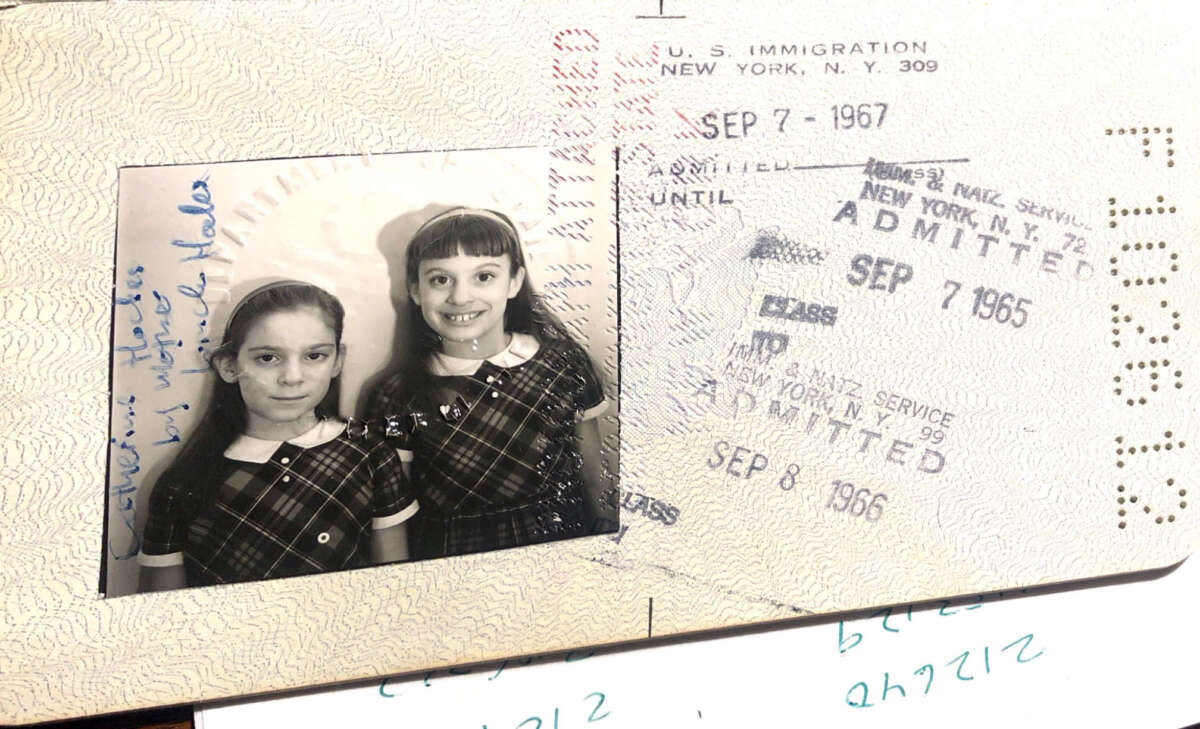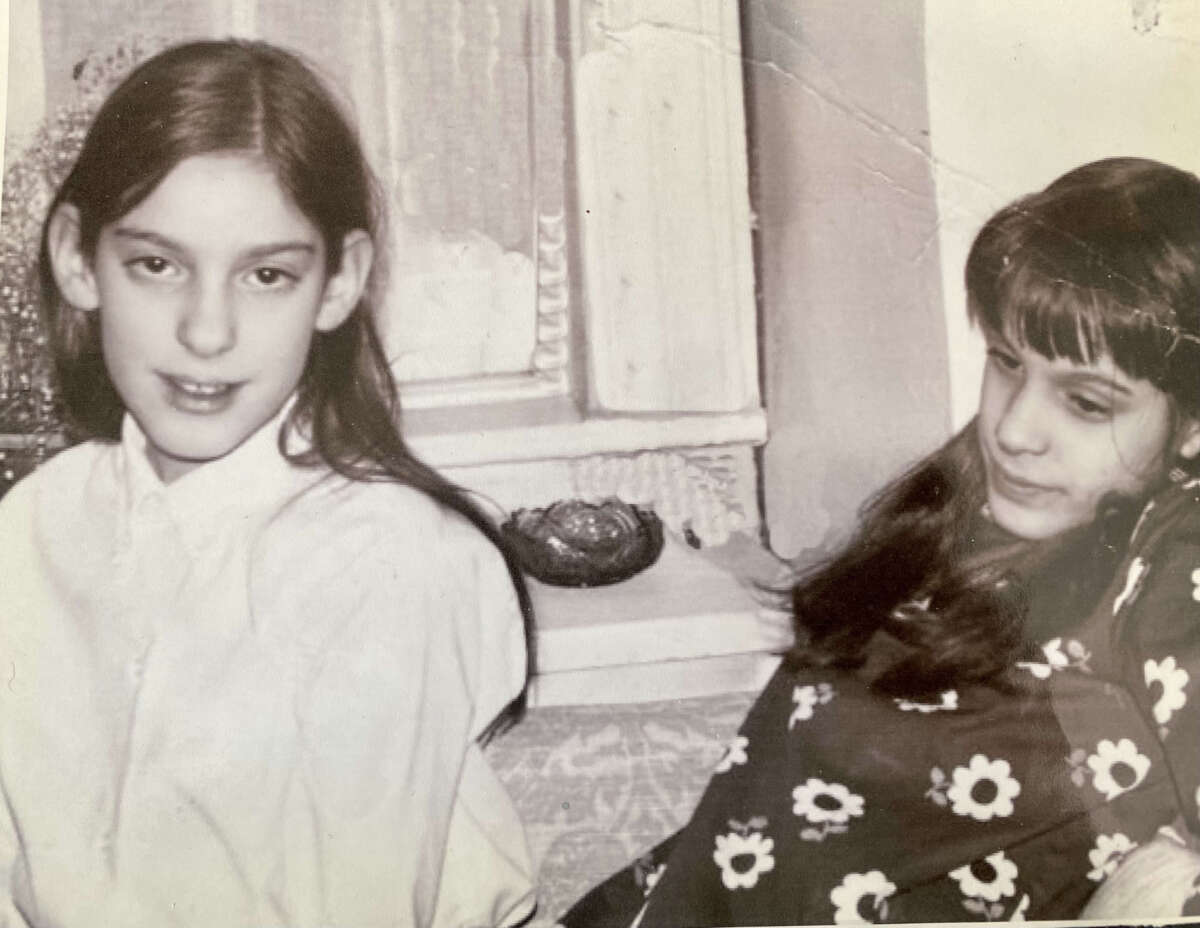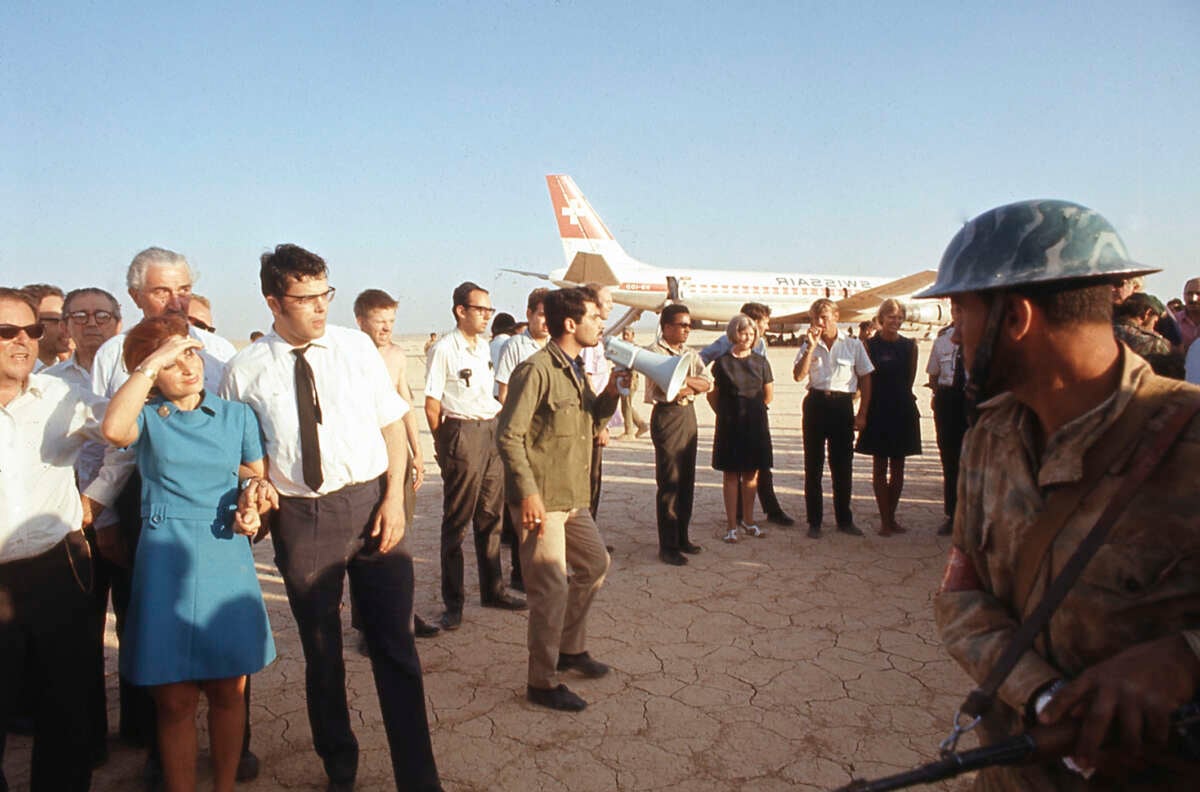Part of the Series
Struggle and Solidarity: Writing Toward Palestinian Liberation
I was a hostage in 1970 at age 13, caught in global events that were beyond my capacity to comprehend. I was held, together with my younger sister, for a week under difficult conditions. It began when the Popular Front for the Liberation of Palestine commandeered our aircraft not long after we left Frankfurt, a stopover on our trip from Israel to New York City, where we lived. I had visited close relatives in Tel Aviv six times in my short life, usually during summer vacations from school. This trip home began like all the others, but soon turned into a traumatic odyssey, beginning with the screams of passengers as a man ran toward the cockpit brandishing a gun.
Many frightening hours later, we landed in the Jordan desert as captives. Outside the window of the plane in which we were trapped, I could see trucks mounted with machine guns, tents and supplies, and people dressed in fatigues and keffiyehs. Two other hijacked planes landed alongside us. The next day, I saw dynamite being wired through the plane’s cabin; a serious man questioned me as to why I had been in Israel, and required me to relinquish my American passport. I was hot and dirty and hungry and scared. I concentrated on watching over my younger sister who seemed numb and pale with shock. Over the days I spent in the desert, a select group of non-Jews were released. Babies wailed, passengers prayed, including those who donned Tefillin in the aisles, swaying and davening. The Palestinian commandos in charge of the planes brought medications for sick hostages, played jump rope with children, fed hundreds of people, and told us their stories (termed propaganda by news outlets).
My sister and I were released six days after our ordeal began. Along with most of the other hostages (some though, remained captive), we were driven in small trucks through the desert, through the city of Amman, then flown to Cyprus for processing, and finally returned home to family, school and friends. In spite of nightmares and disruptions, it never occurred to me that anyone should pay for what had happened to us. Instead, I wondered why it had happened.
I had been raised in a secular Jewish family, no Bat Mitzvah, no planting trees in Israel, and only celebrating Passover when invited to others’ Seders. But like most every New York Jew with roots in Ashkenazi Europe, I absorbed the notion of a Jewish State as naturally as drinking water or breathing air. My childhood visits to Israeli relatives involved beaches, adventure, food, a new language, and children to run around and play with. I was also aware of relatives in army fatigues carrying weapons, the placement of tape over windows, and bomb shelter directions; things a young child might not think about too deeply. But of course, I grew up and began to recall those images and ponder them.


I vividly remember an argument I had in my twenties with a close friend, also Jewish, who stated that the Holocaust demanded the establishment of the State of Israel. Although at the time I could not have discussed the alternative concept of Jewish diasporism, I remember saying, “Why does establishing a safe place for Jews mean herding us all into one small area, as if other places should not be safe for us? And why must the people in that area, who had nothing to do with the Holocaust, be eradicated? How does safety for Jews lead to the destruction of a whole other people?”
Later, my learning continued (and my sister wrote a book about the experience). I learned that the hijackers who held 300 hostages on three planes in the desert were not religious zealots. The Popular Front for the Liberation of Palestine was a secular group with a Marxist-Leninist ideology, whose goal was to establish one socialist democratic Palestinian state. They were political revolutionaries, seeking justice, to be heard and to return home. But it wasn’t until the Second Intifada in 2000 that I personally began to understand Israel’s provocations and aggression, its goal to undermine an independent Palestinian state with growing numbers of armed and illegal settlements, increasing civilian deaths, and the razing of thousands of farms and homes. The murder of American Rachel Corrie in 2003, along with the violent retaliation by Israel towards Palestinian people protesting injustice, further reified why I had been held hostage 30 years earlier — a tiny figure in a vast and bloody landscape of occupation, colonialism and genocide, which I was painfully beginning to grasp.
In spite of nightmares and disruptions, it never occurred to me that anyone should pay for what had happened to us. Instead, I wondered why it had happened.
Six hostages were found dead in a tunnel on September 1. My heart breaks for today’s hostages. I know what my parents went through while I was being held captive. What the families of today’s hostages are enduring is indescribably searing. Will they find comfort in the deaths of tens of thousands of people in the names of their loved ones? My own father wanted to fly to Jordan and rescue us. Our captivity took a great toll. Never though, did he articulate wanting revenge or retaliation. The only words I recall were expressions of sorrow about the intractability of global politics, and the rising death toll in Palestine. The agonizing experience of being a hostage causes me to resonate deeply with the closing off of the Gaza Strip, the families trapped there, and the Palestinians held hostage to Israeli policy and in Israeli prisons.
At 13, I thought the United States might drop bombs on the hijackers who held us. In fact, years later, I learned this was Nixon’s plan, which was discouraged by Melvin Laird, his secretary of defense. As a child, I was as afraid of the American bombs as I was of my captor’s dynamite. There was no difference. I didn’t want to die; I didn’t want anyone to die. I wanted to go home to my family, my community. In my experience, and the experience of current Israeli hostages and their families, calls for vengeance and overpowering force create more danger and serve to intensify the conditions that caused the hostage-taking in the first place.
Jews will never find safety or live our values by laying claim to a small and ancient strip of land, not deserted and unloved as the Zionists, influenced by European colonizers, insisted, but filled with people and farms and villages with names. Jews belong everywhere. Everywhere we live, everywhere we contribute, including the places where we were once exiled and murdered. Living in the diaspora while maintaining connection to our culture and identity is the way Jews have survived for millennia with our values and humanity intact.
Were it not for the genocide carried out in our names over the last 75 years, perhaps we would also be living peacefully and productively in Palestine.
Note: An update has been made to clarify that the hijackers in 1970 did not separate all Jews from non-Jews during their days in the desert.
Trump is busy getting ready for Day One of his presidency – but so is Truthout.
Trump has made it no secret that he is planning a demolition-style attack on both specific communities and democracy as a whole, beginning on his first day in office. With over 25 executive orders and directives queued up for January 20, he’s promised to “launch the largest deportation program in American history,” roll back anti-discrimination protections for transgender students, and implement a “drill, drill, drill” approach to ramp up oil and gas extraction.
Organizations like Truthout are also being threatened by legislation like HR 9495, the “nonprofit killer bill” that would allow the Treasury Secretary to declare any nonprofit a “terrorist-supporting organization” and strip its tax-exempt status without due process. Progressive media like Truthout that has courageously focused on reporting on Israel’s genocide in Gaza are in the bill’s crosshairs.
As journalists, we have a responsibility to look at hard realities and communicate them to you. We hope that you, like us, can use this information to prepare for what’s to come.
And if you feel uncertain about what to do in the face of a second Trump administration, we invite you to be an indispensable part of Truthout’s preparations.
In addition to covering the widespread onslaught of draconian policy, we’re shoring up our resources for what might come next for progressive media: bad-faith lawsuits from far-right ghouls, legislation that seeks to strip us of our ability to receive tax-deductible donations, and further throttling of our reach on social media platforms owned by Trump’s sycophants.
We’re preparing right now for Trump’s Day One: building a brave coalition of movement media; reaching out to the activists, academics, and thinkers we trust to shine a light on the inner workings of authoritarianism; and planning to use journalism as a tool to equip movements to protect the people, lands, and principles most vulnerable to Trump’s destruction.
We urgently need your help to prepare. As you know, our December fundraiser is our most important of the year and will determine the scale of work we’ll be able to do in 2025. We’ve set two goals: to raise $150,000 in one-time donations and to add 1,500 new monthly donors.
Today, we’re asking all of our readers to start a monthly donation or make a one-time donation – as a commitment to stand with us on day one of Trump’s presidency, and every day after that, as we produce journalism that combats authoritarianism, censorship, injustice, and misinformation. You’re an essential part of our future – please join the movement by making a tax-deductible donation today.
If you have the means to make a substantial gift, please dig deep during this critical time!
With gratitude and resolve,
Maya, Negin, Saima, and Ziggy
